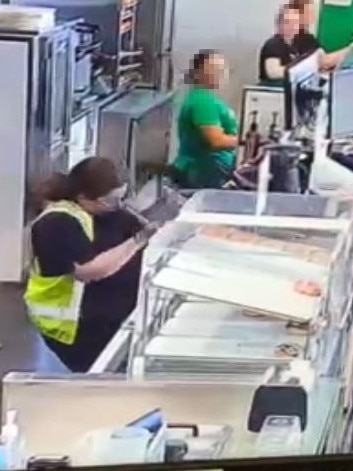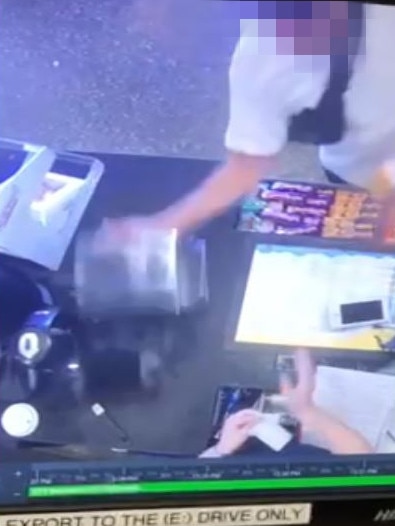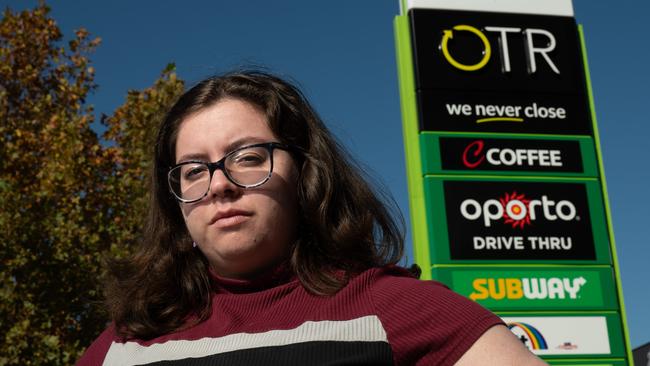A new safety campaign is being launched as South Australian petrol stations become a ‘hot bed’ of violent crime
Evidence showing the state’s newest hotbed of violent crime has been highlighted in a compilation of wild incidents captured on CCTV. Watch the vision and find out what is being done about it.
SA News
Don't miss out on the headlines from SA News. Followed categories will be added to My News.
South Australian petrol stations are “dangerous” and vulnerable to more violent crime like banks, sparking a new safety campaign amid calls for better security and planning rules.
Ahead of a major retail crime summit this week, a new study reveals at least 4000 SA retail staff work at more than 600 “high risk” and “soft target” outlets that are facing surging offending.
The state’s biggest union on Sunday will unveil a new safety campaign for workers, who are exposed to a “hotbed” of violent crime including armed hold-ups, robberies and assaults.
One worker told how violence and abuse was “so commonplace that they were ‘on the phone to the police almost every night’”, a “startling” SDA survey revealed.
The powerful “shoppies” union, which represents retail staff, is calling for an overhaul to planning and workplace laws as there are no mandatory or uniform rules for the multimillion industry.
Ministers said the state government will consider any reforms – including how service stations are designed and approved – but industry leaders say owners have spent millions of dollars boosting safety.
As a new report highlighted how “inherently vulnerable” forecourts are, the SDA survey revealed almost all petrol workers had witnessed and experienced physical or verbal abuse.
More than one in 10 respondents are an armed robbery victim.


SDA state secretary, Josh Peak, called for urgent action to fix “alarming” failures laid bare in a union-commissioned study into the petrol stations, most of which are open around-the-clock.
“All petrol station workers deserve a safe workplace,” said Mr Peak, who has written to Premier Peter Malinauskas, a former SDA leader, Attorney-General Kyam Maher, Planning Minister Nick Champion and Police Minister Dan Cregan.
“Incidents of theft and abuse are increasing in petrol stations and more must be done to keep workers safe.
“No petrol station worker should have to go to work and worry if they’re going to come home safely.”
He said stronger security measures included mandatory safety screens, dual night staff and “night-time windows”, secondary exits for workers, secured cash along with CCTV or surveillance. Late night “sales incentives” can help increase human traffic.
The McKell Institute study, titled “Fuel on Fire: fixing policy gaps driving petrol station robberies in SA”, finds that as fuel shops expanded “so too has a wave of crime targeting these businesses”.
Its 33 page report, which includes interviews with crime victims, concludes stations are unsafe and workers “highly exposed to criminal activity”.
Petrol retail is a “high-risk” job amid rising armed hold-ups, thefts and assaults, which “clearly pose significant” risks of physical and mental harm.
Shops are a “soft target” robbery targets because of large cash volumes and high value, but unprotected, stock such as cigarettes or painkillers, the research warned.

Researchers also criticised building designs failures that help opportunistic, or “stop and rob” thieves, who typically raid shops at night.
The report, which will be discussed at a government retail crime “roundtable” on Wednesday, warns solutions were not just for police.
Authors urge “target hardening” to mitigate violence and harassment – such as banning in shop customers after 10pm – while SafeWork SA should establish a petrol station code of practice.
Workplace laws should be overhauled to include defining armed robberies a “dangerous incident”, meaning bosses would be legally obligated to notify SafeWork SA.
“Service stations are inherently vulnerable to robbery,” the report states.
“They are situated close to major arterials, allowing thieves to flee quickly; they are often laden with cash; they stock valuable commodities such as cigarettes or painkillers and are … poorly protected from violent crime.
“In terms of their vulnerability to robbery, service stations are the new banks.”

It adds: “As the spate of service station violence has escalated, so too have the dangers facing working people who make their living working at service stations.
“These individuals are usually younger … and are routinely faced with traumatic experiences in the workplace that can have life altering impacts.
“It is evident that offenders are taking advantage of late trading hours, fewer customers and minimal staff to perpetrate these crimes.”
While the report doesn’t name specific companies, major SA firm OTR has spearheaded the popularity in 24/7 petrol stations along with Coles Express, Woolworths and X Convenience.
The $4.8bn Viva Energy in March successfully closed its $1.215bn takeover of OTR, which the Shahin family founded in Woodville, in Adelaide’s west in 1984.
OTR stores make an average $3.9m of “non-fuel” sales a year, Viva told the stock exchange when announcing its successful takeover.
The Advertiser last year reported how brazen fuel bandits were escaping punishment after stealing petrol despite number plates being reported.
Official data released under Freedom of Information laws revealed at least 32,200 “fuel drive-offs” statewide in the past four years – or more than 20 a day.
Figures also showed fewer than 5 per cent – 1467 – of offenders were charged despite CCTV and licence recognition technology being available.
Police argue fuel prepayments will stop rising offending.
Motor Trade Association SA/NT chief executive officer Darrell Jacobs, whose organisation represents petrol operators, said his industry was addressing safety.
“Service station operators have invested in a range of upgrades and technology to create a safe work environment for workers,” he said.
“These include measures such as secondary exits, safety screens, night windows, lighting, high resolution CCTV, duress systems and safe rooms.
“Operators continue to report theft, property damage and other violent or anti-social behaviour, including CCTV imagery of alleged offenders and licence plates to police.”
He said, “regrettably”, the industry was concerned that rising fuel thefts, and very few arrests, “reinforces perceptions that service stations are a soft target”.
Mr Maher, who is also Industrial Relations Minister, said reform talks would now occur.
“The Government will consider the report and any suggestions from both businesses and unions to keep workers safe,” he said.
He said authorities had “significant steps” to build a stronger working relationship between SafeWork SA and key health and safety stakeholders while the government was committed at improving workplace education.
He said penalties had “significantly increased” for offenders who assault frontline retail workers.
This was now an aggravated offence punishable with a maximum seven years in jail.
Her job was a living nightmare
For Irrinni Mihalaras working as a petrol station retail worker was a living nightmare.
The university student, 24, was employed at an Adelaide OTR for nine months while she juggled her psychology studies.
But she was left “anxious” and “on edge” every day as she waited for an abusive customer to lash out or for the day she would become another crime victim statistic.
She quit her job last month after being left feeling unsafe, especially after being injured.
“When customers would come in and start yelling or becoming aggressive, it made me really anxious, and I would start shaking,” she said.
“If someone ever asked to return something, I was always on edge that they might become aggressive.

“Theft and abuse were a regular occurrence and it felt like there was nothing we could really do about this, we just had to cop it.
“I only worked in the daytime and still feared for my safety every shift. I’ve had people yell at me for all kinds of reasons.”
Ms Mihalaras, who lives in the southern suburbs near her former OTR workplace, quit her job after nine months when a patron assaulted her because she refused to provide a refund.
“A customer threw a metal straw dispenser at me because I wouldn’t give him a refund,” she said.
“It hit me in the face and split my upper lip.
“This incident has mentally scarred me.
“I felt unsafe at work after this incident, and the constant anxiety contributed to my decision to quit.”
She reported the attack to police after it happened in December – the attacker has not been charged.
More Coverage
Originally published as A new safety campaign is being launched as South Australian petrol stations become a ‘hot bed’ of violent crime





